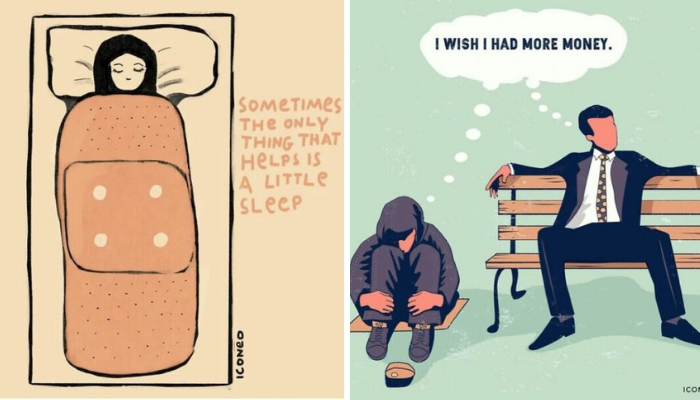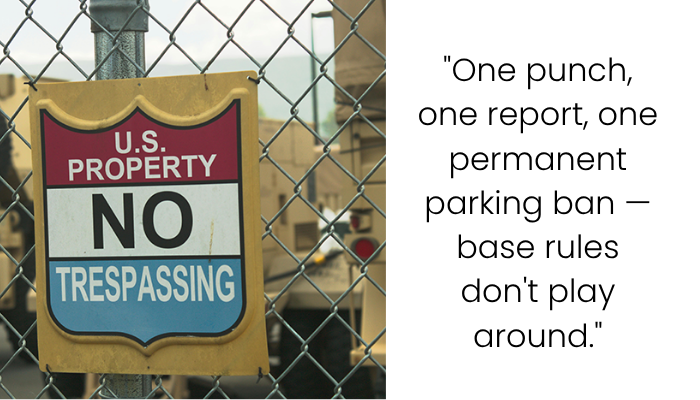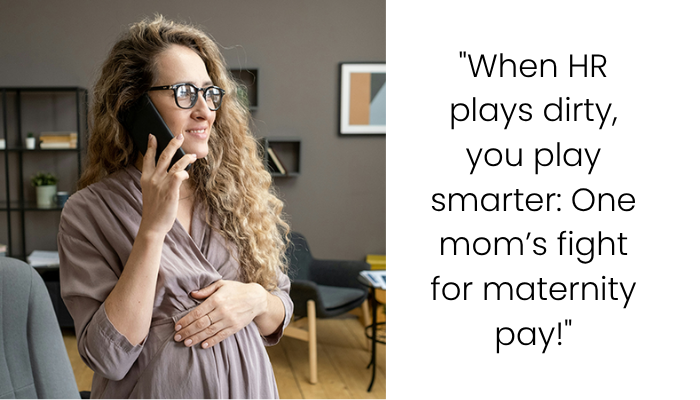When “Working From Home” Isn’t a Free Pass: Freelance Designer Sets Boundaries With Entitled Church Member

A talented freelance graphic designer, based at home, was deep in creating a full branding package—logo, social templates, product mockups—for a longtime client when a church member rang her doorbell. Expecting a casual evening, she was met with an unreasonable demand: her teenage daughter needed a flyer designed for free “since she works from home.” Despite polite refusals and even offering time-saving Canva templates, the woman retorted, “You work from home. It’s not like you have a real job,” hinting she should drop paid work on demand. After standing her ground—that unpaid work, especially under deadline, isn’t acceptable—the entitled request ended in a dramatic exit. The interaction highlights a recurring shift in perception around remote work: the invisible hustle is often misunderstood as endless free time.
Advertisement – Continue Reading Below
Even freelancers tend to have certain workloads every day

So one graphic designer was surprised when a woman really believed she was free in the middle of a workday








The Freelancer’s Emotional and Practical Battleground ⚔️
1. The Illusion of “Always Available” at Home
Working as a freelance graphic designer from your home, you don’t clock into a traditional office—but the perception of availability becomes insidious. You’re physically present, which blurs the traditional 9‑to‑5 boundaries. A foundational study of home‑based self‑employed workers revealed that space and time converge in ways that strain both work and family roles—leading to persistent negotiation of boundaries and conflicts over “entitlement” to your time .
No one sees you sitting at home in front of Illustrator for eight straight hours—and when someone rings the doorbell or texts “I can see your car, I know you’re home,” they presume you’re free to stop everything and help. That sense of entitlement is painful. It’s rooted in a widespread misunderstanding: if you’re home, you’re not “working.” Yet for freelancers, every minute is billable, every interruption chips away at attention and revenue: whether it’s responding to client revisions, drafting new concepts, or simply needing headspace to create.
Advertisement – Continue Reading Below
2. The Emotional Toll of Boundary Erosion
Turning down that church member’s request wasn’t “being selfish”—it was a survival instinct. Freelancers who take unpaid work, even for kin or community, may face emotional manipulation: “You work from home, so it’s not work”—a sentiment that minimizes your labor and creativity. The Freelancer’s Union warns that unpaid work erodes both finances and mental health: every unpaid hour is time not spent on paid projects, personal development, or rest—and it increases burnout risk blog.freelancersunion.org.
Unpaid labor is emotionally draining. It positions you as the default “helpful neighbor,” not a skilled provider with financial obligations—rent, subscriptions, savings. There’s invisible cost: the opportunity cost, the lost time, and the inner voice that says, maybe I’m being less generous or less valued?
That guilt is real. But here’s the truth: you aren’t just designing flyers—you’re running a business, and that business needs income to sustain itself.
Advertisement – Continue Reading Below
3. Stress, Burnout & Financial Instability
In the fragmented landscape of freelancing, stress and instability are default settings, not exceptions. A 2023 UK survey found that 32% of freelancers feel less enjoyment in their work than they used to—a direct result of mounting stress and administrative burdens . Add to that late or missing payments: 31% cheated by “nonpayment” from clients within just a year—and 49% report anxiety, lost sleep, and reduced productivity due to late payments ipse.co.uk.
The ripple effects speak for themselves: delayed bills, late fees, emotional exhaustion. Without financial stability, mental health spirals—and the burden intensifies when generosity is weaponized. That church request wasn’t a harmless favor—it was real-time theft of time you’d already scheduled for paid work and a blow to your rigid deadlines.

4. Work‑Life Balance? A Tug‑of‑War
Flexibility is the golden carrot of freelancing—but that flexibility is a double-edged sword. A 2024 study from University of Malaysia highlights how freelancing can actually worsen work‑life balance, especially with income volatility and long working hours blog.freelancersunion.org+1parents.com+1researchgate.net. When you’re fighting deadlines, client expectations, and catch‑up sessions, personal life gets squeezed. Ironically, the freedom to choose when to work can morph into compulsion—to justify income, to meet deadlines, to prove you’re worthy of being called a “real professional.”
Advertisement – Continue Reading Below
There’s also the psychological cost of boundary erosion. Remote work research shows that flexibility boosts job satisfaction—but without discipline and structure, off‑hours bleed into work hours. Burnout becomes a looming threat when you regularly cross the 55‑hour work week threshold en.wikipedia.org.
5. Strategies to Fortify Your Freelancing Defenses
A single interaction like this can serve as a turning point. Here are tried-and-true strategies for reinforcing your freelance fortress:
• Define—and Communicate—Your Boundaries
Share your “office hours” prominently: use statuses like “Do Not Disturb” on email/chat, close your home-office door, set a visible calendar. Evidence suggests freelancers who clearly show they’re “busy” can shift external perceptions—and that social expectations adjust when you formalize your timing .
Advertisement – Continue Reading Below
• Master the Art of Saying “No” or “Later”
“It’s wonderful you’d ask, but I’ve got a paid deadline until Friday 5 PM” sends a firm, polite message. The time you refuse to give is time reclaimed to meet your client’s expectations—and time respected as yours.
• Charge—or Walk Away
Free work for family, church, or friends chips away at your professional integrity. Charge a token fee or ask them to book you formally. This subtle financial boundary telegraphs value and discourages “Hey, could you just…” requests. If they balk, walk away. It’s business.
• Build Buffers in Your Workflow
Block time intentionally: e.g., “client work” from 9‑noon, “admin/unpaid requests” 4‑5pm. Tools like calendars, timers, and batch‑scheduling can guard against scope creep and help you resist “one quick job” distractions.
Advertisement – Continue Reading Below
• Track Unpaid Time with the ROI Mindset
Use your invoicing software or a spreadsheet to log unpaid commitment. At month-end, tally the hours—you’ll see exactly what you gave away and how much it cost. That context can guide conversation and behavior moving forward.

• Leverage Community and Shared Norms
Freelancing doesn’t have to be lonely. Join designer forums, Slack groups, or local meetups. Shared boundaries become easier when others reinforce them. Reddit threads are littered with stories like yours—voices of solidarity that say, “Yes, I’m also tired of being asked to do free work,” and share responses that worked .
6. Financial Self‑Care: The Freelance Balance Sheet
Solid finances build emotional resilience. Irregular incomes are a freelancing reality: according to a guide from Ovlg.com, freelancers juggle personal vs business expenses, self‑employment tax, variable cash flow—and it can be daunting ovlg.com.
Advertisement – Continue Reading Below
• Build an Emergency Fund
With unpredictable payments and fees, three-to-six months of living expenses are essential. It gives you breathing space when turnover dips—and when you have to reject those freebie requests guilt‑free.
• Use Contracts—and Uphold Them
Always define scope, deadlines, payment terms (like deposits and reminders). When boundaries are in your contract, turning down unpaid work or stopping scope creep is enforceable—not rude.
• Prioritize Self‑Payment
Treat yourself as an essential expense. When you pay yourself first—like rent or bills—operational business pressures don’t creep into your headspace.
Advertisement – Continue Reading Below
• Invoice Promptly, Follow‑Up Decisively
Late or missing payments disproportionately harm freelancers. Use automated reminders beginning before due dates. Don’t be afraid to apply late fees. Getting paid on time doesn’t have to feel awkward—it can feel professional.
7. Burnout: Not Just a Word, But a Warning
Burnout isn’t optional—it’s a risk. Long working hours, emotional depletion, and lack of boundaries create a perfect storm. The WHO/ILO warns sustained remote work beyond 55 hours per week ramps up physical and mental health issues en.wikipedia.org. Freelancers often lack built‑in support systems for government‑mandated breaks, sick leave, or holiday time—so self-care must be intentional.

Real case: Vogue Business documented the fashion industry’s burnout culture. Freelancers struggle with inconsistent pay and overwork—mental health declines—especially in competitive sectors .
Advertisement – Continue Reading Below
8. Reframing Flexibility: More Than Just Work Hours
Yes, remote freelancing gave you flexibility. But that gift can backfire if the default expectation becomes “answer any ping at any hour.” Here’s how to reframe:
Flexibility with guardrails. Reserve “flex hours” for client calls and workshops—but commit to creative flow by shielding deadlines until after your peak work block. Flexibility isn’t chaos—it’s choice.
Announce your boundaries publicly. Send private newsletter updates: “Heads up—I’ll be offline this Friday finishing your project; responses resume Monday.” Clear communication reduces assumption‑based interruptions.
Advertisement – Continue Reading Below
Decline without guilt. That church request? A polite boundary could have gone like: “I’d love to help in theory, but I’m booked solid. However, here are some free Canva resources that may work.” You did that—and more importantly, your client got what they hired you to deliver. Nothing selfish about that.
9. Community as Shield Against Entitlement
You’re not alone. The BoredPanda coverage and Reddit threads echo your experience—plentiful tales of entitlement from friends, family, and community boredpanda.com. These stories often highlight the same solution: clear boundaries and professional communication. When you align your personal boundaries with business boundaries, entitlement becomes untenable.
10. Reflection and Empowerment
Ending with your uplifting moment: when she walked off and you laughed, that was liberation. You reclaimed not just your time—but your identity as a professional: a full-time freelance graphic designer, not just a neighbor or church volunteer. You refused to blur client deadlines, professional pride, or your pricing structure—all because someone thought, “Oh, you’re home, you’re free.”
Advertisement – Continue Reading Below
That moment isn’t an outlier—it’s emblematic. For every freelancer, there comes a turning point when they assert: this is my job. And that’s not something to apologize for—it’s something to celebrate.
Readers shook their heads at the woman’s entitlement






You’ve shared an all-too-common moment: someone devaluing your time because they saw you at home. But let this midview remind you—and everyone who reads it—that:
- Your home office is a professional space, not a convenience.
- Every hour you spend is an earned investment, not a gift.
- Setting boundaries isn’t rude, it’s essential—both emotionally and financially.
- Burnout, instability, entitlement—these are systemic freelancing challenges, but they can be managed.
- Saying “no” or “not now” is not selfish—it’s business stewardship.
You earned your career. Your schedule is your livelihood. Keep those headphones on. Close the door. Protect your creative flow—and your emotional well‑being. 😊
Advertisement – Continue Reading Below






